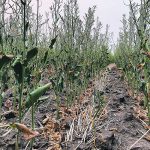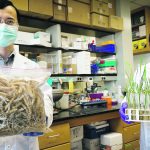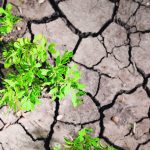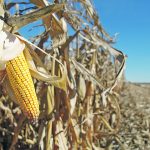Narrow roots more easily penetrate hard soil, which means breeding crops to foster this type of root could help boost crop productivity
Most scientists say climate change is altering heat cycles and rainfall patterns leading to harder, drier soils that challenge crop growth and yield. Hard soil caused by machinery compaction is compounding the problem. It can lead to yield reduction of some 25 percent and, when combined with drought, up to 75 percent. The problem is […] Read moreStories by Margaret Evans

Scientists place soil microbes under surveillance
A technique to track microbes helps scientists better understand the strategies different microbes use to process carbon
Studying soil microbes is extremely difficult considering how tiny they are and how many there are. Not enough is known about their needs to grow them in a lab. Yet these microscopic organisms contribute to the global carbon cycle and are essential to the health of the biosphere. Recently, researchers at Cornell University in New […] Read more
Public considers calf age in views on slaughter
Survey finds practice is generally acceptable, but the age of the calf when it is slaughtered influences opinions
What happens to surplus or unwanted calves in the dairy industry and what is the public’s attitude to that? Those are questions on a recent survey conducted by researchers at the University of British Columbia, who wanted to assess public attitudes toward how surplus dairy calves are managed and how calf management practices influence these […] Read more
Farmer actions in disease outbreaks called vital
Research identifies what producers can do during an outbreak to slow spread of infection and reduce disease impacts
The control of livestock infectious diseases often depends on appropriate policy guidelines and control measures. But recent research at the University of Warwick in the United Kingdom underscores the importance of the farmer’s role in controlling disease outbreaks and protecting the national herd through local control. An example of protection at the individual level is […] Read more
Heat disables plant defences by turning off gene
Discovery of the gene has helped scientists reverse the shortcoming and boost plants’ defences in rising temperatures
Heat waves hitting Europe, the United Kingdom, as well as regions of Canada and the United States are threatening plants as well as people. While scientists have known that heat suppresses a plant’s ability to make salicylic acid, the defence hormone that protects plants against pests, they have not understood why plants suffer this immunity […] Read more
New generation of CRISPR is able to multi-task
The latest technology can now edit multiple genes in plants while simultaneously changing the expression of other genes
In 2012, a powerful molecular gene-editing tool known as CRISPR-Cas9 was discovered by American scientist Jennifer Doudna and French scientist Emmanuelle Charpentier and their colleagues. It was a game-changer in refining the DNA of crops to improve qualities like yield, growth and drought and pest resistance. The discovery earned the scientists the 2020 Nobel Prize […] Read more
Research shows flash droughts happening faster
Rapid onset droughts, which dry out soil within five days, have increased from three to 19 percent around the world
Recent research from the University of Texas at Austin, the Hong Kong Polytechnic University and Texas Tech University has shown that flash droughts are as threatening as flash floods and are developing much more quickly than traditional droughts. Rapid onset droughts — those that dry out soils within five days — have increased from three […] Read more
Climate effects on aflatoxin in corn crops

Nitrogen dynamics can help make adjustments
Researchers suggests producers could split fertilizer applications if weather is excessively wet before the growing season
Given the soaring cost of nitrogen fertilizer, farmers want to make informed decisions on application rates to maximize yields. Researchers at the University of Illinois recently examined the role of the pre-growing seasonal weather in relation to nitrogen. “When farmers plant corn in spring they already know what happened (with the weather) during the pre-growing […] Read more
Research explores personality traits in dairy cows
Cows’ personalities will define how they behave, such as those that are confident enough to explore their pasture for food
Most farmers working daily with dairy or beef herds recognize personality traits in individual animals. That knowledge is helpful for herd management and it is also a key indicator linked to productivity, health and the welfare of those vulnerable to stress and at greater risk to sickness. Recognizing the importance of personality profiles, researchers at […] Read more



